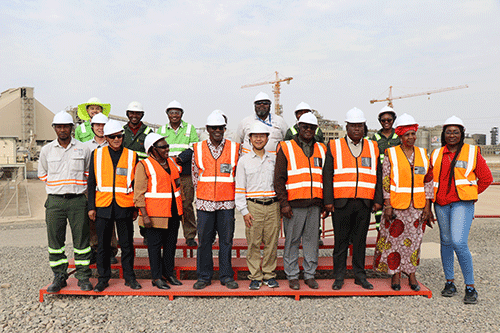George Sanzila
SWAKOPMUND – Chairperson of the Parliamentary Standing Committee on Natural Resources, Tjekero Tweya said there is a need to reverse government policies that are found to stifle economic activities and progress.
Tweya mentioned this during one of the familiarisation visits to mining companies currently underway in the Erongo region.
The Parliamentary Standing Committee is visiting mining companies to inspect if they are complying with labour and environmental laws, fulfilling corporate social responsibility duties, and ascertaining government shareholding and beneficiation.
A sub-committee on mines and energy under the umbrella of the Natural Resources Committee has been created for this purpose.
So far, the four mining companies of Rössing Uranium, Swakop Uranium, Langer Heinrich Uranium, and Symphonie Stone Processing have been visited as part of the committee’s oversight function.
According to the committee, some policies tend to be counterproductive and have serious implications on operational activities. This became apparent after both the general manager for operations at Rössing Uranium, Martin Tjipita, and executive vice president at Swakop Uranium, Irvinne Simataa cited water and energy costs as too exorbitant and therefore affecting profits and operations.
This situation, according to the mining companies, is exacerbated by regulations that limit own generation even when mining companies have the capacity to establish their own water and energy plants.
Simataa said the mine, which gobbles up over 70% of the Erongo region’s total water consumption to keep its operations afloat, faces the risk of water shortages going forward unless an urgent solution is found.
“Water is a challenge. The mine uses between 65% to 70 % of the total water consumption in Erongo at nine million cubic metres per annum. This is a huge risk. Equally, ECB requires entities to produce renewable power of up to a maximum of 30%. We have the capacity to develop our own water and power sources if given the chance, but we are limited by these restrictions,” said Simataa.
He, however, hailed the government’s liberalisation policy that has allowed NamWater to enter into partnerships with private investors to develop an additional desalination plant that would help lessen the burden.
Simataa said the company currently produces up to 12 megawatts of its own energy requirements from solar power and that plans to increase this generation by up to 17 megawatts to sustain its activities were underway.
Restrictive laws
Tweya, who is leading the delegation of MPs, was not happy with the latter policies, labelling them as restrictive, citing they were stunting progress.
“Namibia is one of the countries in Africa with the highest water and energy costs. Some of these policies are making the situation worse for companies, slowing economic activities, and encroaching on their profit that would have otherwise helped to uplift our economy and our people. If companies have the capacity to generate their own electricity and water, why not let them?” queried Tweya.
As an alternative, the general manager at Langer Heinrich Uranium Johan Roux noted that the company has begun plans to recycle its water and obtained an extraction permit to draw some of its water from the Swakop River.
Exploitation, empowerment for SMEs
The committee was not happy that mining companies continued to outsource what they termed as “mundane” tasks to foreign-owned companies at the expense of locals. This after, it became evident that metal drums used to store uranium ore for export were imported from South Africa. They accused some investors of exploiting and extracting Namibia’s resources without benefiting the citizens.
“It cannot be correct that up to now, only South Africa can manufacture drums. Why don’t you give SMEs those specifications? Give them a chance so that they can get experience. If there are still investors out there who still want to exploit us, those days are gone. This is no longer about standards, we know these games,” said Tweya.
Member of Parliament Kennedy Shakupakela said members of the public cannot continue to suffer when the country has vast resources.
“In the past, we had a few mines, but they built schools, clinics, and other infrastructure. Now that we have many, you only hear of a few donations here and there,” complained Shakupakela.
Unity in mining sector
During a meeting that preceded the site visits, Erongo region governor Neville Andre bemoaned the lack of coordination among stakeholders in the mining sector, adding that this is affecting the relationship between mining companies and the local leadership, resulting in the exploitation of mineworkers.
According to Andre, although he was pleased with the proliferation of mining activities in the region and their contribution to the country’s Gross Domestic Product (GDP), there was an urgent need for coordination.
“The regional leadership is not aware of so many mining activities taking place in the region. We also lack inspectors and have engaged the responsible ministry to monitor, assess, and make sure that the law is followed. Local companies are not capacitated to take part in mining activities,” said Andre.
He further said despite training institutions imparting skills to young people, mining companies are not collaborating with these institutions so that they can give graduates job opportunities.
The committee is mandated by the constitution and the Standing Rules and Orders of the National Assembly to conduct oversight visits, to ensure accountability. The visit will culminate in a comprehensive report that will be tabled in Parliament for discussions and adoption before it is presented to the relevant ministry for implementation.
Other members of Parliament such as Kletus Karondo who chairs the subcommittee on mines and energy within the Natural Resources Committee, Maria Kamutali, Diederik Vries, and Maria Elago were part of the visits.
*George Sanzila works for the National Assembly in the Division: Research, Information, Publications and Editorial Services


